District Court proposal faces pushback from town justices
Magistrates president sees higher costs, bureaucracy with countywide court; DA says new court would be much more efficient
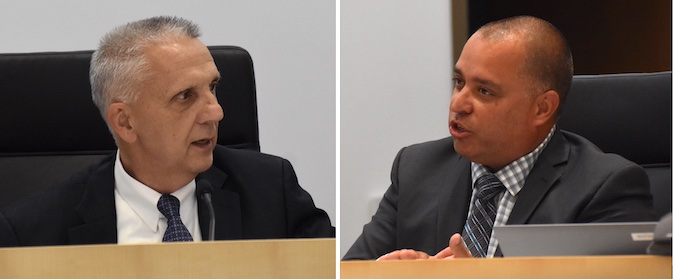
Photos by Tom Rivers: Orleans County District Attorney Joe Cardone, left, shares his views on the benefits of the countywide district court while Albion Town Justice Joe Fuller, president of the Orleans County Magistrates Association said too many details are missing for the issue to go to a public vote in November.
ALBION – The first public meeting about a district court in Orleans County lasted more than two hours on Wednesday evening, with strong pushback from local town justices in the Orleans County Magistrates Association.
Proponents of the court, including District Attorney Joe Cardone and Public Defender Joanne Best, said a countywide district court would be much more efficient for the community. It would be open daily from Monday through Friday with at least one full-time judge for arraignments, small claims and other issues. A second part-time judge would also likely serve the court, Cardone said.
“We feel we can streamline many of the things going on in justice courts,” Cardone said during a meeting that was attended by about 50 people in person, with another 20 through Zoom video conferencing. “Our focus is to make the best system in Orleans County.”
Cases would move through the courts much faster because the district court would be staffed full-time. There wouldn’t be monthly DA nights like there is now in some of the town courts, which stretches out cases for many months, Cardone said.
There would be full-time court clerks instead of the part-time staff at town courts which would allow people to access information Monday through Friday.
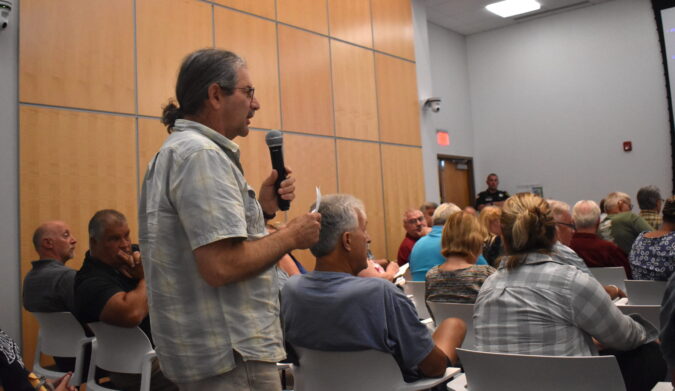
Michael Zelazny of Shelby said he has an open mind about a district court but wanted to see more information about the financial impact for creating a new court. He spoke during a public meeting Wednesday in the legislative chambers of the County Office Building.
Cardone and Best said they see centralized district courts as a mandate in the future from the state. Previous state reports, as well as an investigative series in the New York Times, have found inconsistencies and many shortcomings in the town courts in upstate New York, with deficiencies in the court facilities and questionable decisions by the justices.
Cardone said he foresees the state will require justices be attorneys, who have a deeper understanding of the law.
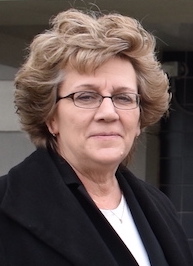
Joanne Best
Best said the county should act to form a district court that could be tailor made for Orleans, rather than waiting for a state mandate.
“We are looking at the changes on the horizon,” Best said. “I think we should be ahead of the 8-ball rather than behind it.”
Joe Fuller, Albion town justice and president of the Magistrates Association, said there has been little information from proponents on the proposal on why it would be a good fit for the county. “I’m not in favor of this at all,” Fuller said.
Fuller is on the committee exploring a district court for the county but he said there have been few solid facts presented on what the new court would cost, where it would be located and the impact on the 10 town courts.
Fuller praised the 11 town justices for being close to the people in dispensing justice, and doing it in facilities that are already paid for.
The Magistrates Association estimates a district court would cost about $1 million a year for two judges, clerks, security and a facility.
“Orleans County is a poor, rural county that is already taxed to max,” Fuller said.
He said the 11 town justices include seven people who served as law enforcement or corrections officers. One of the justices, Ed Grabowski of Shelby, is an attorney who taught criminal justice classes. (Grabowski said he is concerned having a centralized court in either Albion or Gaines would be a hardship for some residents from the eastern and western ends of the county who would have to travel 10 to 15 miles to get there.)
Fuller said the justices go to training each year and have access to resources through the Office for Court Administration. The local justices follow state guidelines for sentencings and fines, Fuller said.
Other speakers, including Yates Town Supervisor Jim Simon, urged the Legislature to rescind a resolution to put the issue on the ballot in November. Simon said more information is needed for the public to sees the pros and cons of the new district court. He urged a committee tasked with studying the issue to complete a report with the results to be shared with residents and officials.
The Yates Town Board last week voted in opposition of a district court because the town officials didn’t believe there is nearly enough information available, Simon said.
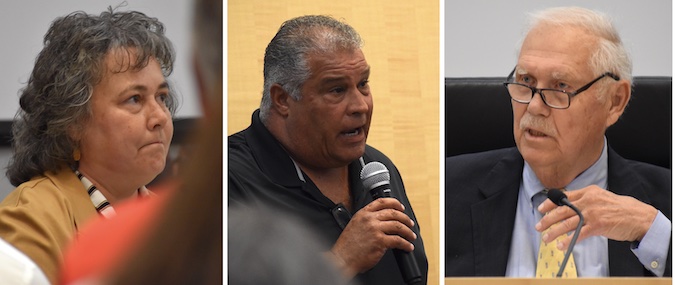
These speakers include, from left: Sherry Davenport, town justice in Summerhill in Cayuga County (past president of the NYS Magistrates Association); Richard DeCarlo, former Barre town justice; and Bruce Schmidt, former Gaines town justice and a member of the district court committee.
Sherry Davenport, a past president of NYS Magistrates Association, faulted the Orleans County Legislature for voting to put the district court on the ballot in November before there have been public hearings and detailed report about the issue.
“There seems to be a real rush to judgement here and I’m not sure why that is,” she said.
Lynne Johnson, County Legislature chairwoman, said the Legislature needed to approve a resolution for the public referendum by Aug. 7 in order to be on the ballot. She said more public hearings are forthcoming.
The Orleans County government website also has information about the district courts and will be adding more.
Joanne Best, the public defender, urged the town boards and town courts to supply more information to the committee about costs and cases so a more comprehensive report can be done.
Best and Cardone both said the towns haven’t been forthcoming in supplying requested information.
Richard DeCarlo, a former Barre town justice for six years, said he doesn’t want to see another layer of government. However, he sees where the state could mandate a centralized court. He said it may not be much of an advantage to form the district court ahead of a state mandate.
“I came in here tonight with questions and now I have more questions,” DeCarlo said. “That’s not how a public meeting should work. Let’s pause and think about this and get some good, hard numbers together.”
Bruce Schmidt, a former Gaines town justice who has worked for both the district attorney’s and public defender’s office, said he supports getting ahead of the likely state mandate for the centralized court.
He said there is shortage of attorneys in the county, a fact emphasized by Cardone and Best. The district court would be less burdensome for the DA and Public Defender, as well as law enforcement and probation which are trying to send personnel to 10 different town courts.
“I think it is in the best interests of the county to be ahead of the game,” Schmidt said.
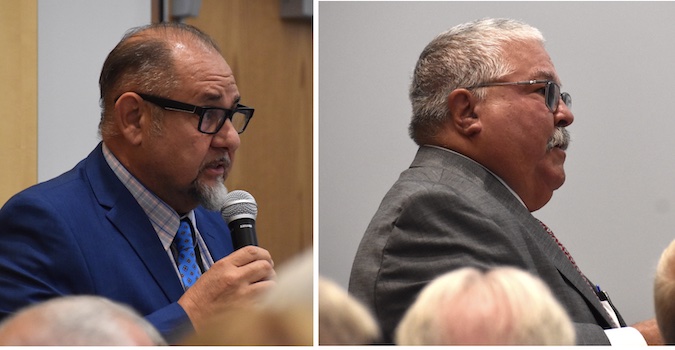
These speakers include Dean S. Puleo, left, who is special counsel for the 8th Judicial District and works with town justices in the eight Western New York counties; and Dennis Young, a town justice in East Otto, Cattaraugus County. He is the current president of the NYS Magistrates Association.
Dean Puleo is a resource to the town justices in the eighth judicial district. He works as special counsel and assists justices with their annual training as well as questions they have, sometimes during an evening court session.
Puleo said the justices are all trained. If they don’t take mandated annual training, they are pulled from the bench until it’s complete.
He said the public should have confidence that the town justices are competent on the bench.
Dennis Young, a town justice in Cattaraugus County and president of NYS Magistrates Association, noted the “extensive” training for the justices through the Office for Court Administration.
He said town justices “are the very definition of a public servant.”
He also was critical about a lack of details on the district court proposal in Orleans County. He said it would be “fiscally irresponsible” for the county to go to a district court.
“No study has been done or shared with the public,” he said. “The committee hasn’t done its work. It has jumped to a conclusion.”
Cardone and Best both said they favor keeping the town courts, which would do landlord-tenant disputes, some civil cases and even some criminal matters.
The district court would handle the need for centralized arraignments in the county in the morning and evening, Cardone said. The state has required that for about three years. The county does those in the county jail every day, including weekends and holidays with a rotation among town justices.
If Orleans formed a district court it would be the third county with one in the state, after Nassau and Suffolk formed their courts in 1964.
Cardone said Orleans has shown it’s open to changes in its courts. He noted Shelby and Ridgeway share a courts facility, and also have an agreement with Yates where the judges in the three towns have jurisdiction in each of the towns.
Nine of the 10 towns have reduced the number of town justices from two to one in recent years. Only Albion has two because it has a higher caseload.
During Cardone’s tenure as district attorney over three decades, the villages of Albion and Medina both eliminated their village courts.
The changes have resulted in a reduction of local judges from 24 to 11, Cardone said.
“I have nothing but respect for our town justices,” he said. “We’re just proposing what we feel would be better for the community.”
If the public supports the district court in the referendum, Cardone said it could be two years or more before the court would be ready. The State Legislature would also need to pass legislation to allow the court in Orleans.
“This is the beginning of an arduous process,” Cardone said.







































































